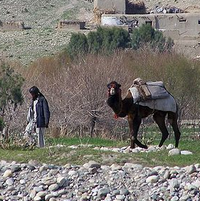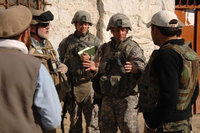A paper by Maj. Jim Gant, titled, “One Tribe at a Time” (.pdf), has been getting all sorts of attention since it ran on Steven Pressman’s site a few weeks back. I finally got down to reading it last night after Andrew Exum flagged it as an alternative to COIN in Afghanistan. Where to begin? The paper is a collection of nativist mythologies that have run as a theme throughout the West’s imperial age. Last of the Mohicans? Lawrence of Arabia? Dances with Wolves? They’re in there. So is an element of Stockholm Syndrome, for that matter. The problem arises […]
Afghanistan Archive
Free Newsletter
NewsHour’s Margaret Warner interviews Abdullah Abdullah, former Afghanpresidential candidate. ‘People are very agitated, they witnessed whathappened during the campaign,’ he said of his supporters. Abdullah saysthat he has called for restraint, but that he will not join a Karzaicampaign based on principles.
Hassan Abbas of the Asia Society speaks with WorldFocus’ DaljitDhaliwal. The former Pakistani government official offers insight intowhat a Karzai second term means for the United States and how theU.N.’s decision to stop development work along the dangerousAfghanistan-Pakistan border will affect locals.

LOGAR PROVINCE, Afghanistan — “Let’s go get blown up,” Staff Sgt. Ashley Hess quipped as he climbed into his armored vehicle on a hot, bright mid-October morning. Sgt. Hess and the rest of the U.S. Army’s 2nd Platoon, Able Troop — part of the 3rd Squadron of the 71st Cavalry regiment deployed to this fertile agricultural province south of Kabul — steered their vehicles down a dirt road code-named Route New York. The route is a favorite with insurgent bomb teams, who prefer burying their explosives directly under a vehicle’s path — something that’s nearly impossible on paved roads. Many […]
One of the ironies of human thought is the way in which a new conceptual paradigm initially empowers effective action by challenging outmoded assumptions, only to later become hardened and resistant to empirical challenges itself. At that point, the once-revolutionary system of thought often does little more than empower the stubborn preference for theory over reality. That process used to take generations, but with the advent of modern communications, the pace has accelerated. I think it’s possible to argue that in the case of the U.S. Army’s COIN doctrine, we now have an example of it happening over the course […]
If you’re interested in a political scorecard for Afghanistan — post-election fiasco — from a non-Coalition perspective, MK Bhadrakumar has a pretty sobering assessment at Asia Times Online. The essential takeaway is that in going after Afghan President Hamid Karzai but failing to either effectively sideline him or force him to accept an acceptable power-sharing arrangement, the Obama administration — and Western governments in general — emerge dramatically weakened. The irony, according to Bhadrakumar, is that in emphasizing legitimacy as the election’s litmus test, the West burned its bridges with a Karzai team that is actually well-positioned to deal with […]
Over at Kings of War, Paula Broadwell has a review and discussion of Mark Moyar’s book on leadership in counterinsurgency, “A Question of Command.” According to Broadwell’s reading (I haven’t read the book itself), Moyar presents an alternative to the dominant population-centric approach to COIN, whereby the civilian population represents the center of gravity to be won over through improved security and better governance. Instead, Moyar argues, the determinant factor in counterinsurgency is the leadership elites on both sides, leading him to examine what qualities should then be selected for in COIN leadership. The qualities he arrives at seem pretty […]

Much ink has been spilt over the question of whether or not globalization leads to the “death” of the nation-state, or at least its eclipse by a rising tide of super-empowered non-state actors — especially multinational corporations. On this score, history has been fairly clear: States that score high on globalization connectivity typically feature governments with extensive regulatory reach and strong enforcement capacity — not exactly the demise of the public sector. And yet, it’s also true that globalization’s increasingly dense weave of networks poses significant challenges to government oversight. I can think of no credible expert who argues that […]
